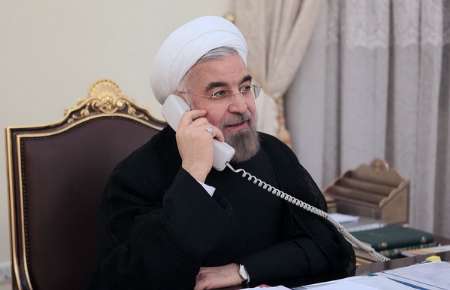LATEST
- UN Human Rights Council Renews Mandate of Special Rapporteur on Iran
- US Senate Votes Unanimously for Non-Binding Measure to Reimpose Sanctions “If Iran Violates Nuclear Deal”
UPDATE 1600 GMT: France’s Foreign Minister Laurent Fabius has downplayed the phone call from President Rouhani to his French counterpart Francois Hollande, saying that Rouhani was “not very precise” on whether Tehran is ready to compromise in the nuclear talks.
Fabius also talked down the need to complete a deal before a informal deadline of March 31, asserting that the priority is getting a solid agreement.
The Foreign Minister said, “There has to be new efforts by our Iranian partners. There has been some progress, but there are things which are not yet solved.”
Iran and the 5+1 Powers (US, France, Britain, Germany, China, and Russia) are reportedly disputing the timing of the lifting of US-led sanctions and Tehran’s retention of uranium centrifuges for research and development at the Fordoo enrichment plant.
,
UPDATE 1500 GMT: Iran’s lead negotiator, Deputy Foreign Minister Abbas Araqchi, has expressed caution over the state of the talks, while indicating that an agreement in Switzerland may leave details to be confirmed later.
“All differences are serious and we are trying to reduce these differences,” Araqchi, told reporters in Lausanne. “We are still hopeful and optimistic, but it is still soon to state if we will be able to obtain a solution on all issues or not.”
He noted that both sides are trying to reach a solution on all issues and then write down the details in black and white in the coming months.
Araqchi said that the Iranian negotiators will stay in Lausanne as long as needed.
Nuclear talks between Iran and the 5+1 Powers resumed on Thursday, as President Rouhani made personal appeals to other leaders for an agreement.
Two rounds of meetings were led by Iranian Foreign Minister Mohammad Javad Zarif and Secretary of State John Kerry. They were joined by their political and technical teams, with France, Britain, Russia, China, and Germany also participating at deputy level.
After the talks between the deputies, Iranian Deputy Foreign Ministers Abbas Araqchi and Majid Takht-e Ravanch met with their Russian counterpart Sergey Rybakov.
In Tehran, President Rouhani used phone calls to European leaders to issue the statement:
We should move in the direction of national and international interests and do not let this opportunity… be missed easily.
Special conditions are prevailing over the negotiations because our common positions regarding the peacefulness of [Iran’s] nuclear activities and the necessity of removal of all unjust sanctions can lead us to the final solution.
Rouhani called British Prime Minister David Cameron, French President Francois Hollande, and Russian leader Vladimir Putin, and also wrote “the leaders of the P5+1 group of countries”, according to his office.
Significantly, the Iranian President tried to blunt France’s hard-line approach in the talks by praising its “positive role” in nuclear talks between Iran and the French-British-German group from 2003 to 2005.
Rouhani asked for France’s “active role” in the current discussions: “Enemies of relations between the two states want a non-constructive role of France in the negotiations, but the French government will undo their objectives by [playing] its constructive role.”
France stiffened demands at the end of last week in the previous round of talks, leading to tension within the 5+1 Powers and an adjournment of the negotiations. Earlier this week, Israel sent two high-level Ministers to Paris to ask the French to be even tougher in areas such as sanctions relief, the duration of the agreement, and the arrangements over Iran’s centrifuges for uranium enrichment.
Hollande’s office maintained a cautious line, according to his office, “The President, while insisting on Iran’s legitimate right to use peaceful nuclear power, insisted on the need to work towards a lasting, robust and verifiable agreement on Iran’s nuclear program.”
UN Human Rights Council Renews Mandate of Special Rapporteur on Iran
The UN Human Rights Council voted on Friday to renew the mandate of Dr. Ahmed Shaheed, the Special Rapporteur on Iran.
The measure passed 20-11, with 16 abstentions.
The vote followed Shaheed’s presentation on March 16 of his latest report on human rights in Iran. The report said executions in Iran in 2014 were at their highest level since 2002. It noted the ongoing detention of hundreds of political prisoners, and deteriorations in women’s rights, minority rights, and on-line freedoms.
The Iranian regime has refused to let Shaheed, who has been Special Rapporteur since 2011, enter the country. Instead, he has compiled his reports through phone calls with Iranians inside the country, interviews with those outside, and documents.
US Senate Votes Unanimously for Non-Binding Measure to Reimpose Sanctions “If Iran Violates Nuclear Deal”
The US Senate voted unanimously on Thursday for a non-binding measure pointing to renewed sanctions if Iran violates a nuclear deal.
The 100 legislators supported the concept of a fund to cover the cost of imposing sanctions if Tehran violated terms of an interim nuclear agreement in effect until July or of any final agreement.
The amendment is symbolic, but it points to Congressional action to challenge President Obama’s process of confirmation for a deal.
Senators have called for any agreement to be submitted to the chamber for approval, even though the President is not legally obliged to seek their assent.
The Senate also passed a non-binding amendment to compensate American victims of the 1979 Iran hostage crisis.

